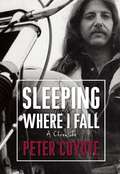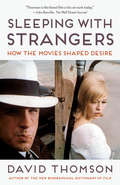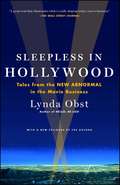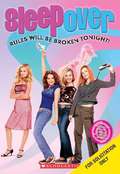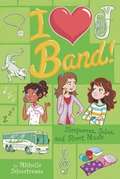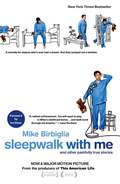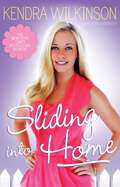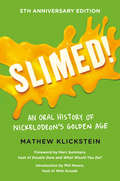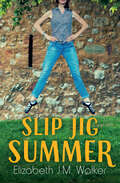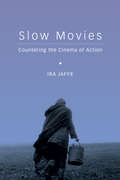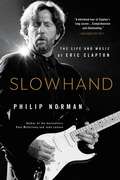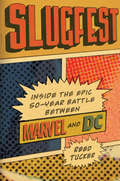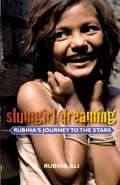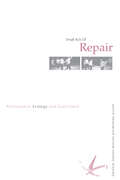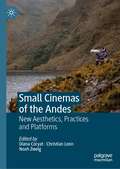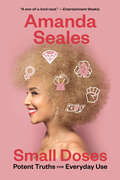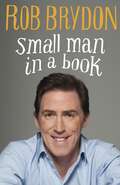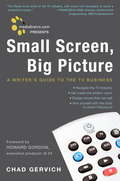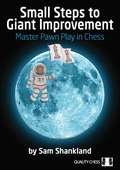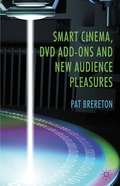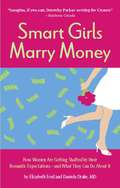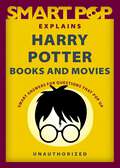- Table View
- List View
Sleeping Where I Fall: A Chronicle
by Peter CoyoteIn his energetic, funny, and intelligent memoir, Peter Coyote relives his fifteen-year ride through the heart of the counterculture -- a journey that took him from the quiet rooms of privilege as the son of an East Coast stockbroker to the riotous life of political street theater and the self-imposed poverty of the West Coast communal movement known as The Diggers. With this innovative collective of artist-anarchists who had assumed as their task nothing less than the re-creation of the nation's political and social soul, Coyote and his companions soon became power players. In prose both graphic and unsentimental, Coyote reveals the corrosive side of love that was once called "free"; the anxieties and occasional terrors of late-night, drug-fueled visits of biker gangs looking to party; and his own quest for the next high. His road through revolution brought him to adulthood and to his major role as a political strategist: from radical communard to the chairman of the California Arts Council, from a street theater apprentice to a motion-picture star.
Sleeping with Strangers: How the Movies Shaped Desire
by David ThomsonFrom the celebrated film critic and author of The Biographical Dictionary of Film, an original, seductive account of sexuality in the movies and of how actors and actresses on screen have fed our desire.Film can make us want things we can not have. But, while sometimes rapturous, the interaction of onscreen beauty and private desire speaks to a crisis in American culture, one that pits delusions of male supremacy against feminist awakening and the spirit of gay resistance. Combining criticism, his encyclopedic knowledge of film history, and memoir, David Thomson examines how film has found the fault lines in traditional masculinity and helped to point the way past it toward a more nuanced understanding of what it means to be a person desiring others. Ranging from advertising to pornography, Rudolph Valentino to Moonlight, Rock Hudson to Call Me By Your Name, Katharine Hepburn and Cary Grant to Phantom Thread, Thomson shows us the art and the artists we love under a new light. He illuminates the way in which film as art, entertainment, and business has been a polite cover for a kind of erotic séance. And he makes us see how the way we watch our movies is a kind of training for how we try to live.
Sleepless in Hollywood
by Lynda ObstBy the author of the bestseller Hello, He Lied, a veteran producer takes a witty look at the new Hollywood. Lynda Obst returns to dish on the experts, tastemakers, and moguls of today's Hollywood and the movies they make. She describes how the movie business has lost its MO--and is now losing its talent to network and especially cable TV.With the collapse of the DVD market, the movie industry was crippled. The business reacted by producing tentpoles (mega-hits) or tadpoles (which nobody gets a chance to see). Why? Since the majority of their revenue comes from the foreign market, especially China and Russia, studios are no longer dependent on expensive stars or dialogue (i.e. writers). Special effects and 3D replace people. Obst speaks from the front lines. Her subjects are friends, moguls, former employers, mentors, and even relatives, who express their opinions with disarming bluntness and hilarity. Obst combines her experiences with insights from the smartest people in the business. In what Obst calls the New Abnormal (because Hollywood wasn't normal to begin with), studios are paralyzed. Can the movie business be resurrected? Can it once again make the movies that make us laugh, cry, and wish we could own the DVD? Obst is ready.
Sleepover
by Suzanne WeynIt's the summer before high school and Julie and her friends are psyched--sort of. They're all heading to Julie's house for a sleepover bash.
Sleepovers, Solos, and Sheet Music #3
by Genevieve Kote Michelle SchustermanFormer middle-school band director Michelle Schusterman continues to celebrate the high notes and low notes of middle-school band! The band is off to New Orleans for a competition as well as a bit of sightseeing. But there is all sorts of boy treble in the band this spring. Julia has her first boyfriend, so Holly will have to keep focused to help her friends through their drama AND make sure the New Orleans trip is a trip to remember.
Sleepwalk with Me: and Other Painfully True Stories
by Mike BirbigliaComedian Mike Birbiglia&’s hilarious New York Times bestseller is now a major motion picture co-written and produced by Ira Glass (This American Life) starring Birbiglia and Emmy-nominated actress Lauren Ambrose (Six Feet Under).Finalist for the Thurber Prize for American Humor Sleepwalk with Me is a comedic memoir, but I&’m only thirty-two years old, so I&’d hate for you to think I&’m &“wrapping it up,&” so to speak. But I tell some really personal stories. Stories that I considered not publishing time and time again—about my childhood, about girls I made out with when I was thirteen, about my parents, and, of course, about my bouts with sleepwalking. Bring this book to bed. And sleepwalk with me.
Sliding Into Home
by Jon Warech Kendra WilkinsonThe breakout star of the E hit shows The Girls Next Door and Kendra. Playboy cover model Kendra Wilkinson opens up about life, love, and living with Hugh Hefner in this entertaining and candid new memoir.
Sliding Into Home
by Jon Warech Kendra WilkinsonKENDRA BARES ALL Fans of the E! smash hit series The Girls Next Door fell in love with sporty Playboy beauty Kendra Wilkinson’s care- free spirit, infectious laugh, and down-to-earth nature. Now that she’s moved out of the world’s most famous bachelor pad and into her own delightfully chaotic world on Kendra as wife to NFL star Hank Baskett and mother to their newborn son, we’ve watched her hilarious antics as she adjusts to domestic life. But how much do we really know about the fun-loving star? In this humorous and optimistic, sometimes heartbreaking, but always unfailingly honest memoir, Kendra reveals the highs and lows of her extraordinary journey. She wasn’t always the quintessential girl next door. Before she was a reality television superstar, Hugh Hefner’s girlfriend, or one of the most popular Playboy cover models ever, Kendra was an athletic tomboy whose father walked out on her family when she was a little girl. She grew into a rebellious teenager with a serious drug habit before she quit cold turkey and beat the odds to graduate from a high school that almost didn’t give her a second (or third, or fourth) chance. Following her rocky teenage years, an out-of-the- blue phone call from Hugh Hefner changed everything. Kendra dishes candidly about life in the Playboy Mansion: the sex, the parties, the show, and even her relationships with her Girls Next Door costars—Hef, Holly, and Bridget. She tells the true story about how she and Hank met and built a relationship in secret while she was still Hef’s girl- friend and a public face of Playboy. Finally, she reflects on the slew of unexpected changes in the short space of a year that have brought her sliding into home from Playboy party girl to wife and mother with a blooming Hollywood career. If you think you’ve seen all of Kendra, think again. She’s only warming up. . . .
Slimed!: An Oral History of Nickelodeon's Golden Age
by Mathew KlicksteinSLIMED! An Oral History of Nickelodeon's Golden Age tells the surprisingly complex, wonderfully nostalgic, and impressively compelling story of how Nickelodeon -- the First Kids' Network -- began as a DIY startup in the late 70s, and forged ahead through the early eighties with a tiny band of young artists and filmmakers who would go on to change everything about cable television, television in general, animation, and children's entertainment, proving just what can be done if the indie spirit is kept alive in the corporate world. Get the real back story about all of your favorite Golden Age Nick shows: Everything from such classics as You Can't Do That On Television, Out of Control and Double Dare to early 90s faves like The Adventures of Pete & Pete, the original three Nicktoons, Clarissa Explains It All and more ... All from those who made it happen!
Slip Jig Summer (Orca Limelights)
by Elizabeth J. WalkerFifteen-year-old Natalie is obsessed with ballet and plans to spend the entire summer in dance class with her two best friends. But when her mom gets a job out of town, Natalie gets shipped off to stay with cousins she barely knows. Natalie is thrilled when her cousins invite her to join them at the local dance studio. But it turns out it's not a ballet class; it's Irish dance. Skeptical at first, Natalie is surprised to learn she really enjoys the new dance style and agrees to take part in an upcoming competition. But this new passion could result in Natalie having to leave her ballet dreams behind. This short novel is a high-interest, low-reading level book for middle-grade readers who are building reading skills, want a quick read or say they don’t like to read!
Slipper Under Glass (Maggie Jones, Ballerina #1)
by Lee WyndhamThe Exotic World of The Dance... For seven years Maggie Jones has dedicated herself to the dance, dreaming of the day when she'll be Magda Jonescu, prima ballerina. She must prove herself not only to her generous Aunt Jo, who has paid for the lessons and sent fabulous gifts from exotic places, but also to her doubting family. Neither Maggie's father, who is allergic to her feathery costumes, nor her younger brother, who thinks dancing is for sissies, can understand the forces which drive Maggie to practice for hours on end. On Maggie struggles, assailed by doubts, but sustained by her dreams and a yellowed ballet slipper--kept under glass--in which Pavlova danced The Swan. Success comes to Maggie in a strange, unbelievable way and, faced with a golden opportunity, she must learn how to compromise reality with her dreams.
Slow Movies
by Ira Jaffe"In all film there is the desire to capture the motion of life, to refuse immobility," Agnes Varda has noted. But to capture the reality of human experience, cinema must fasten on stillness and inaction as much as motion. Slow Movies investigates movies by acclaimed international directors who in the past three decades have challenged mainstream cinema's reliance on motion and action. More than other realist art cinema, slow movies by Lisandro Alonso, Nuri Bilge Ceylan, Pedro Costa, Jia Zhang-ke, Abbas Kiarostami, Cristian Mungiu, Alexander Sokurov, Bela Tarr, Gus Van Sant and others radically adhere to space-times in which emotion is repressed along with motion; editing and dialogue yield to stasis and contemplation; action surrenders to emptiness if not death.
Slow Movies: Countering the Cinema of Action
by Ira Jaffe"In all film there is the desire to capture the motion of life, to refuse immobility," Agnes Varda has noted. But to capture the reality of human experience, cinema must fasten on stillness and inaction as much as motion. Slow Movies investigates movies by acclaimed international directors who in the past three decades have challenged mainstream cinema's reliance on motion and action. More than other realist art cinema, slow movies by Lisandro Alonso, Nuri Bilge Ceylan, Pedro Costa, Jia Zhang-ke, Abbas Kiarostami, Cristian Mungiu, Alexander Sokurov, Bela Tarr, Gus Van Sant and others radically adhere to space-times in which emotion is repressed along with motion; editing and dialogue yield to stasis and contemplation; action surrenders to emptiness if not death.
Slowhand: The Life and Music of Eric Clapton
by Philip NormanFrom the bestselling author of Shout!, comes the definitive biography of Eric Clapton, a Rock legend whose life story is as remarkable as his music, which transformed the sound of a generation.For half a century Eric Clapton has been acknowledged to be one of music's greatest virtuosos, the unrivalled master of an indispensable tool, the solid-body electric guitar. His career has spanned the history of rock, and often shaped it via the seminal bands with whom he's played: the Yardbirds, John Mavall's Bluesbreakers, Cream, Blind Faith, Derek and the Dominoes. Winner of 17 Grammys, the Rock 'n' Roll Hall of Fame's only three-time inductee, he is an enduring influence on every other star soloist who ever wielded a pick. Now, with Clapton's consent and access to family members and close friends, rock music's foremost biographer returns to the heroic age of British rock and follows Clapton through his distinctive and scandalous childhood, early life of reckless rock 'n' roll excess, and twisting & turning struggle with addiction in the 60s and 70s. Readers will learn about his relationship with Pattie Boyd--wife of Clapton's own best friend George Harrison--the tragic death of his son, which inspired one of his most famous songs, "Tears in Heaven," and even the backstories of his most famed, and named, guitars. Packed with new information and critical insights, Slowhand finally reveals the complex character behind a living legend.
Slugfest: Inside the Epic, 50-year Battle between Marvel and DC
by Reed TuckerThe first in-depth, behind the scenes book treatment of the rivalry between the two comic book giants.THEY ARE THE TWO TITANS OF THE COMIC BOOK INDUSTRY--the Coke and Pepsi of superheroes--and for more than 50 years, Marvel and DC have been locked in an epic battle for spandex supremacy. At stake is not just sales, but cultural relevancy and the hearts of millions of fans.To many partisans, Marvel is now on top. But for much of the early 20th century, it was DC that was the undisputed leader, having launched the American superhero genre with the 1938 publication of Joe Shuster and Jerry Siegel's Superman strip. DC's titles sold millions of copies every year, and its iconic characters were familiar to nearly everyone in America. Superman, Batman, Wonder Woman--DC had them all.And then in 1961, an upstart company came out of nowhere to smack mighty DC in the chops. With the publication of Fantastic Four #1, Marvel changed the way superheroes stories were done. Writer-editor Stan Lee, artists Jack Kirby, and the talented Marvel bullpen subsequently unleashed a string of dazzling new creations, including the Avengers, Hulk, Spider-Man, the X-Men, and Iron Man.Marvel's rise forever split fandom into two opposing tribes. Suddenly the most telling question you could ask a superhero lover became "Marvel or DC?"Slugfest, the first book to chronicle the history of this epic rivalry into a single, in-depth narrative, is the story of the greatest corporate rivalry never told. Complete with interviews with the major names in the industry, Slugfest reveals the arsenal of schemes the two companies have employed in their attempts to outmaneuver the competition, whether it be stealing ideas, poaching employees, planting spies, or launching price wars. The feud has never completely disappeared, and it simmers on a low boil to this day. With DC and Marvel characters becoming global icons worth billions, if anything, the stakes are higher now than ever before.
Slumgirl Dreaming: Rubina's Journey to the Stars
by Rubina AliMy name is Rubina Ali. I don't know when my birthday is, and nor does my father, but I do know that I am nine years old. Young Rubina is a one-in-a-million star. Plucked from among five hundred slumkids who auditioned for Danny Boyle's multi-Oscar-winning filmSlumdog Millionaire,she saw her fairy-tale dream of stardom come true. Now that she has stepped into the limelight, what will life hold for a young girl from the Mumbai slums? Rubina tells her own incredible story, bringing to life a world of wastelands and rat-infested shanty dwellings, where she played marbles with her friends beside the sewers of Garib Nagar. She introduces her beloved father, a hardworking rickshaw puller, and her siblings. And then Rubina tells of the kindness of Danny Boyle and of the time she spent on the film sets--including the hilarious incident when her costar came to be covered in chocolate from head to toe. After her brief encounter with red-carpet glamour, how will Rubina come to terms with the conditions in which she, her family, and her friends continue to live since Hollywood came knocking? This is her compelling story.
Small Acts of Repair: Performance, Ecology and Goat Island
by Stephen Bottoms Matthew GoulishGoat Island are one of the world’s leading contemporary performance ensembles. Their intimate, low-tech, intensely physical performances represent a unique hybrid of strategies and techniques drawn from live art, experimental theatre and postmodern dance. Small Acts of Repair: Performance, Ecology and Goat Island, is the first book to document and critique the company’s performances, processes, politics, aesthetics, and philosophies. It reflects on the company’s work through the critical lens of ecology – an emerging and urgent concern in performance studies and elsewhere. This collage text combines and juxtaposes writing by company members and arts commentators, to look in detail at Goat Island’s distinctive collaborative processes and the reception of their work in performance. The book includes a section of practical workshop exercises and thoughts on teaching drawn from the company’s extensive experience, providing an invaluable classroom resource. By documenting the creative processes of this extraordinary company, this book will make an important contribution to the critical debates surrounding contemporary performance practices. In so doing, it pays compelling tribute to committed art-making, creativity, collaboration, and the nature of the possible.
Small Cinemas of the Andes: New Aesthetics, Practices and Platforms
by Diana Coryat Christian León Noah ZweigThis book examines the emergence of small cinemas of the Andes, covering digital peripheries in Ecuador, Bolivia, Peru and Colombia. The volume critically assesses heterogeneous audiovisual practices and subaltern agents, elucidating existing tensions, contradictions and resistances with respect to established cinematic norms. The reason these small cinematic sectors are of interest is twofold: first, the film markets of the aforementioned countries are often eclipsed by the filmmaking giants of Mexico, Brazil and Argentina; second, within the Andean countries these small cinemas are overshadowed by film board-backed cinemas whose products are largely designed for international film festivals.
Small Doses: Potent Truths for Everyday Use
by Amanda SealesThis “one-of-a-kind read” offers insightful essays, poignant life advice, and pithy pearls of wisdom from the comedian and star of HBO’s Insecure (Entertainment Weekly). Anyone who has seen Amanda Seales’s acclaimed stand-up special I Be Knowin, her long-running TV series Insecure, or her groundbreaking gameshow Smart Funny & Black, knows that this woman is a force of nature. In both life and career, she has fearlessly and passionately charted her own course. Now she’s bringing her life’s lessons and laughs to the page with her signature blend of academic intellectualism, Black American colloquialisms, and pop culture fanaticism. This volume of essays, axioms, original illustrations, and photos provides Seales’s trademark “self-help from the hip” style of commentary, fueled by ideology formed from her own victories, struggles, research, mistakes, risks, and pay-offs. Unapologetic, fiercely funny, and searingly honest, Small Doses engages, empowers, and enlightens readers on how to find their truths while still finding the funny!
Small Man in a Book
by Rob BrydonRob Brydon tells story of his slow ascent to fame and fortune in Small Man in a Book.A multi-award-winning actor, writer, comedian and presenter known for his warmth, humour and inspired impressions, Rob Brydon has quickly become one of our very favourite entertainers. But there was a time when it looked like all we'd hear of Rob was his gifted voice.Growing up in South Wales, Rob had a passion for radio and soon the Welsh airwaves resounded to his hearty burr. However, these were followed by years of misadventure and struggle, before, in the TV series Marion and Geoff and Gavin and Stacey, Rob at last tickled the nation's funny bone. The rest, as they say, is history. Or in his case autobiography.Small Man in a Book is Rob Brydon's funny, heartfelt, honest, sometimes sad, but mainly funny, memoir of how a young man from Wales very, very slowly became an overnight success.Rob Brydon was brought up in Wales, where his career began on radio and as a voiceover artist. After a brief stint working for the Home Shopping Network he co-wrote and performed in his breakthrough show, the darkly funny Human Remains. He has since starred in the immensely popular Gavin and Stacey, Steve Coogan's partner in The Trip, and was the host of Would I Lie to You? and The Rob Brydon Show. He now lives in London with his wife and five children.
Small Screen, Big Picture: A Writer's Guide to the TV Business
by Chad GervichFrom mediabistro.com, the media industry's most well-respected source for jobs, professional development, and community, this inside-the-business guide gives you the knowledge and tools you need to infiltrate Hollywood and land a job as a TV writer. That's right--Small Screen, Big Picture gives you a competitive edge over millions of other aspiring writers who share your talent, creativity, and determination . . . because after reading these pages, you'll have the one thing they lack: an understanding of the business of television.This journey into Hollywood's inner workings not only details how networks, studios, and production companies work together, it teaches you how the process affects the creation and writing of TV series, how shows make money, and--ultimately--how you can use this information to break into the industry. You'll learn:* What really goes on in the inner sanctum of the writers' room--and how to be a part of it* How today's TV business model works--and how rapidly it's changing * Who has the power to buy a show idea--and how to pitch your own* How new media formats are changing television--and how to use them to your advantage* Which jobs will kick-start your TV writing career--and how to get hired * And much more . . .Armed with this solid foundation of knowledge, you'll be ready to plan your entry into the industry and begin your successful TV writing career.
Small Steps To Giant Improvement
by Sam ShanklandIn chess you cannot take your move back, but you can always return a misplaced piece to its former square at the cost of some time. Pawns on the other hand can never move backwards, making pawn moves truly permanent decisions. This irreversibility makes Pawn Play among the most difficult aspects of chess strategy, which is one reason few books have been written about this topic – and some that have are almost incomprehensible. Double Olympiad gold medalist Sam Shankland has gone the other way – breaking down the principles of Pawn Play to basic, easily understandable guidelines every chess player should know.
Smart Cinema, DVD Add-Ons and New Audience Pleasures
by Pat BreretonExamining post-1990s Indie cinema alongside more mainstream films, Brereton explores the emergence of smart independent sensibility and how films break the classic linear narratives that have defined Hollywood and its alternative 'art' cinema. The work explores how bonus features on contemporary smart films speak to new generational audiences.
Smart Girls Marry Money: How Women Have Been Duped Into the Romantic Dream--And How They're Paying For It
by Ford Elizabeth Drake DanielaWhen did gold-digging become a four-letter word?
Smart Pop Explains Harry Potter Books and Movies
by The Editors of Smart PopWho is Snape? What&’s a horcrux? When did Sirius Black escape from Azkaban? Why was Hermione sorted into Gryffindor? It&’s easy for new fans to get overwhelmed by the sprawling mythology and complexity of the Harry Potter movies and books. Unlike encyclopedias and guides that offer diehard fans trivia, details, and deep dives into every on-screen moment, this first-of-its-kind explainer is an easy, fun, and accessible introduction to the hundreds of characters, plots, and interconnected stories that make up one of the greatest pop culture franchises of all time. Maybe you&’re a First Year and need an entry level class on the magical Hogwarts School of Witchcraft and Wizardry? Are you trying to figure out why Slytherins are so slippery? Trying to parcel out parceltongue? Having trouble sorting out when Dumbledore battled Grindelwald? Or maybe you&’re a confident Ravenclaw who wants to understand why it&’s leviOsa, not levioSA! If you&’re a Muggle, witch, or wizard looking for an easy entry into what literally everyone is talking about then this is the book for you. As the perfect and unauthorized resource to keep on hand when watching something for the first—or tenth—time, Smart Pop ExplainsHarry Potter Movies and Books to you like no one could!
